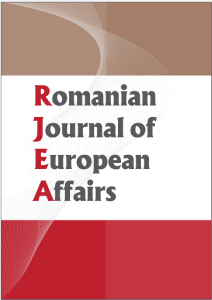In the Summer issue of the Romanian Journal of European Affairs, the contributors bring forward topics concerning: recent changes in the international balance of power; the question of equivalence between ‘Euroscepticism’ and ‘Populism’ in the Czech Republic; an EU perspective on sharing economy as a contributor to sustainable growth; the transition to sustainable development in Kazakhstan and the connections to the assistance given by the EU; political psychology in Transatlantic perspective – a strategy framework for Eastern Europe (the case of Ukraine); as well as the development of the Nord Stream 2 pipeline project.
In the Antechamber of a New Global Bipolarity
Paul Dobrescu, Mălina Ciocea
Abstract:
This paper investigates the shifts in the international balance of power, that we attribute both to the weakening status of the US globally and to the rise of regional powers. The hypothesis of the study is that the world is currently experiencing a short stage of uni-multipolarity, characterised by high instability, which is generated by the rise of new regional hegemons, the changes at the top of power hierarchies, the diminishing gap between the only superpower of the moment, the US, and the rising powers. We point to the tensions caused by a shift in power and status from the global hegemon to the regional hegemons, discussing its consequences in terms of: ideological allegiances, institutions and treaties evolution, development models legitimacy. The following decade will probably confirm the tendency for a return to a new type of bipolar order. Our analysis of the current stage of international relations reveals that we are now witnessing a double bipolarity: an American-Chinese economic bipolarity and an American-Russian military bipolarity.
Keywords: unipolarity, multipolarity, bipolarity, regional hegemons, development models
Populism and Euroscepticism in the Czech Republic: Meeting Friends or Passing By?
Petr Kaniok, Vlastimil Havlík
Abstract:
Euroscepticism and populism, however defined, are often taken as two sides of the same coin, both in public discourse and academic debates. This paper challenges this common wisdom by analysing the case of the Czech Republic. Reviewing the EU related press releases produced by either Eurosceptic or Populist Czech parties, covering a six months period in 2014, the paper reveals to what extent there is a match between ‘Euroscepticism’ and ‘Populism’. As for the main results, the paper identifies that a) there is not a positive correlation between these two phenomena in the Czech Republic, and b) Euroscepticism seems to be inspired by Populism more than Populism draws from Euroscepticism in the Czech Republic.
Keywords: Populism, Euroscepticism, Czech Republic, political parties, press release
Sharing Economy as a Contributor to Sustainable Growth. An EU Perspective
Florin Bonciu, Ana-Cristina Bâlgăr
Abstract:
The paper bases its analytical approach on two assumptions: the first refers to a significant change taking place in the contemporary world economy – the phenomenon of multipolarity – and proposes a new concept, that of multi-level manifestation of multipolarity; the second has in view the need of a new model of sustainable economic growth. In the context of these two points of view, the paper analyses the sharing economy as a potential significant contributor to sustainable economic growth. The conclusion of this research is that sharing economy has a huge potential of involving millions or even billions of participants and of capitalizing the existing assets while providing spill over effects in the economy. The authors expect sharing economy to become a form of economic activity that will complement traditional forms of business while generating positive economic, social and environmental effects.
Keywords: economic growth, circular economy, sustainable development, multipolarity
Kazakhstan: Sustainable Development in Transition and Connection to the EU’s Assistance
Sabina Chukayeva, Bakhytzhan Akzharov
Abstract:
This year the World Leaders considered and adopted the new ambitious Sustainable Development Agenda “Transforming our World: The 2030 Agenda for Sustainable Development” to end poverty and universally promote shared economic prosperity, social development and environmental protection by 2030. This article explores new realities of the Sustainable Development agenda in the light of the transition from the Millennium Development Goals (MDGs) to the Sustainable Development Goals (SDGs). It is clear today that the global development strategy requires a system renovation and new approaches, corresponding with the reality and challenges of the 21st century. Kazakhstan, being one of the 50 countries participating in the national consultations process on the post-2015 Agenda, brought its own contribution to “The Future We Want” programme. The fruitful cooperation with the European Union adds more perspectives for Kazakhstan as one of the most dynamic developing countries in the Central Asian region. The authors emphasized the importance of the United Nations Organization (UN) leadership in the global strategic planning and controlling long-term strategies, including cooperation between states and civilizations, and inclusion of all points of view, especially that of the youth. This article is intended for specialists as well as a wider audience (e.g. students), who are interested in international relations and organizations, international cooperation, sustainable development, and foreign policy of the Republic of Kazakhstan.
Keywords: sustainable development, UN, Millennium Development Goals (MDGs), Sustainable Development Goals (SDGs), EU, Kazakhstan
The Political Psychology in the Transatlantic Perspective – A Strategy Framework for Eastern Europe: the Case of Ukraine
Katerina Veljanovska Blazhevska, Oliver Andonov
Abstract:
Each nation tends to rationalize the situation, the past – the present and the future – in order to ensure normal living conditions and possible welfare. However, some internally and externally created policies aim to focus or defocus the public’s attention in order to distort the real picture. In political psychology, lies and intrigues are often associated with political effects. All these additional attributes guide the policy into the desired direction. The situation in Ukraine is a real example of a kind of “psychological warfare” of citizens caused as a result of claims made by the neighbouring Russian Federation, political steps and tactics of the European Union and the NATO Alliance. In order to prevent future negative development in this field, there is a need to create a common security strategy for Eastern Europe, as a result of the creation of successful Trans-Atlantic relations and good-neighbourly relations with the Russian Federation. The purpose of this paper is to describe the need for encouraging the creation of a rational attitude of the nations in order to strive for the improvement of the region in which they are located. The theory of public choice is applied as a basis of encouraging a better future in public policies and strategies in a country/region. Political psychology is the main thread utilised to disclose the real picture of relations in Ukraine, and the final results need to be used in the area of creating a new security strategy for Eastern Europe. This work includes empirical research conducted within the Republic of Macedonia. The same applies to the theoretical frame of the paper.
Keywords: rationalization, political psychology, Trans-Atlantic relations, Ukraine, Eastern Europe
NORD STREAM 2 and its Soft Power – an Unfolding Playground for the European Union
Roxana Ioana Banciu
Abstract:
This paper focuses on the Nord Stream 2 pipeline in a double reflection (Russia – the candle, Germany – the mirror) handling one particular aspect that influences Russia-EU relations since the Ukrainian factor emerged as a playground for both East and West tectonic plates – namely the energy sector. It is vital for any global power to understand this approach in order to reach people’s minds, in order to emerge as leaders on the world map and to build a strong perception over a political scene. A recently debated subject is Nord Stream 2. The reason why I have chosen to explore this subject is because I am very interested in how Kremlin seeks to have an exclusive control over Eastern Europe, given the full debate in the last three years. In this thesis I will also discuss some important elements of the Russian Soft Power over Europe introducing the plot of South Stream project.
Keywords: Energy Security, Soft Power, Russia-EU relations, West potential, South Stream, Nord Stream, Public Diplomacy






